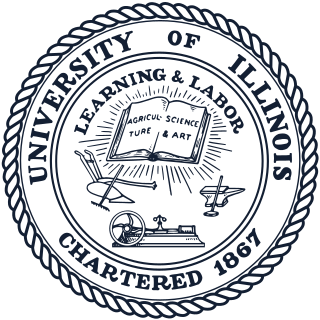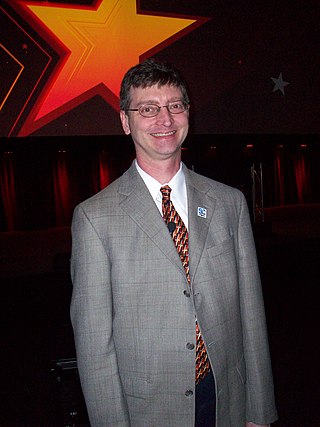Related Research Articles
Nanoscale Molecular Dynamics is computer software for molecular dynamics simulation, written using the Charm++ parallel programming model. It is noted for its parallel efficiency and is often used to simulate large systems. It has been developed by the collaboration of the Theoretical and Computational Biophysics Group (TCB) and the Parallel Programming Laboratory (PPL) at the University of Illinois Urbana–Champaign.

The University of Illinois Urbana-Champaign is a public land-grant research university in the Champaign–Urbana metropolitan area, Illinois, United States. It is the flagship institution of the University of Illinois system and was established in 1867. With over 53,000 students, the University of Illinois is one of the largest public universities by enrollment in the United States.

Jack Joseph Dongarra is an American computer scientist and mathematician. He is a University Distinguished Professor of Computer Science in the Electrical Engineering and Computer Science Department at the University of Tennessee. He holds the position of a Distinguished Research Staff member in the Computer Science and Mathematics Division at Oak Ridge National Laboratory, Turing Fellowship in the School of Mathematics at the University of Manchester, and is an adjunct professor and teacher in the Computer Science Department at Rice University. He served as a faculty fellow at the Texas A&M University Institute for Advanced Study (2014–2018). Dongarra is the founding director of the Innovative Computing Laboratory at the University of Tennessee. He was the recipient of the Turing Award in 2021.
Charm++ is a parallel object-oriented programming paradigm based on C++ and developed in the Parallel Programming Laboratory at the University of Illinois at Urbana–Champaign. Charm++ is designed with the goal of enhancing programmer productivity by providing a high-level abstraction of a parallel program while at the same time delivering good performance on a wide variety of underlying hardware platforms. Programs written in Charm++ are decomposed into a number of cooperating message-driven objects called chares. When a programmer invokes a method on an object, the Charm++ runtime system sends a message to the invoked object, which may reside on the local processor or on a remote processor in a parallel computation. This message triggers the execution of code within the chare to handle the message asynchronously.
Wen-mei Hwu is the Walter J. Sanders III-AMD Endowed Chair professor in Electrical and Computer Engineering in the Coordinated Science Laboratory at the University of Illinois at Urbana-Champaign. His research is on compiler design, computer architecture, computer microarchitecture, and parallel processing. He is a principal investigator for the petascale Blue Waters supercomputer, is co-director of the Universal Parallel Computing Research Center (UPCRC), and is principal investigator for the first NVIDIA CUDA Center of Excellence at UIUC. At the Illinois Coordinated Science Lab, Hwu leads the IMPACT Research Group and is director of the OpenIMPACT project – which has delivered new compiler and computer architecture technologies to the computer industry since 1987. From 1997 to 1999, Hwu served as the chairman of the Computer Engineering Program at Illinois. Since 2009, Hwu has served as chief technology officer at MulticoreWare Inc., leading the development of compiler tools for heterogeneous platforms. The OpenCL compilers developed by his team at MulticoreWare are based on the LLVM framework and have been deployed by leading semiconductor companies. In 2020, Hwu retired after serving 33 years in University of Illinois at Urbana-Champaign. Currently, Hwu is a Senior Distinguished Research Scientist at Nvidia Research and Emeritus Professor at University of Illinois at Urbana-Champaign.
David J. Kuck, a graduate of the University of Michigan, was a professor in the Computer Science Department the University of Illinois at Urbana-Champaign from 1965 to 1993. He is the father of Olympic silver medalist Jonathan Kuck. While at the University of Illinois at Urbana-Champaign he developed the Parafrase compiler system (1977), which was the first testbed for the development of automatic vectorization and related program transformations. In his role as Director (1986–93) of the Center for Supercomputing Research and Development (CSRD-UIUC), Kuck led the construction of the CEDAR project, a hierarchical shared-memory 32-processor SMP supercomputer completed in 1988 at the University of Illinois.
Edward Seidel is an American academic administrator and scientist serving as the president of the University of Wyoming since July 1, 2020. He previously served as the Vice President for Economic Development and Innovation for the University of Illinois System, as well as a Founder Professor in the Department of Physics and a professor in the Department of Astronomy at the University of Illinois at Urbana-Champaign. He was the director of the National Center for Supercomputing Applications at Illinois from 2014 to 2017.
The Center for Simulation of Advanced Rockets (CSAR) is an interdisciplinary research group at the University of Illinois at Urbana-Champaign, and is part of the United States Department of Energy's Advanced Simulation and Computing Program. CSAR's goal is to accurately predict the performance, reliability, and safety of solid propellant rockets.

William Douglas Gropp is the director of the National Center for Supercomputing Applications (NCSA) and the Thomas M. Siebel Chair in the Department of Computer Science at the University of Illinois at Urbana–Champaign. He is also the founding Director of the Parallel Computing Institute. Gropp helped to create the Message Passing Interface, also known as MPI, and the Portable, Extensible Toolkit for Scientific Computation, also known as PETSc.
Josep Torrellas is Professor and Willett Faculty Scholar in the Department of Computer Science and a research faculty for the Universal Parallel Computing Research Center at the University of Illinois Urbana–Champaign. Torrellas's research area is computer architecture, focusing on speculative multithreading, multiprocessor organization, integration of processors and memory, and architectural support for software debuggability and machine reliability. He has been involved in the Stanford DASH and the Illinois Cedar multiprocessor projects, and led the Illinois Aggressive COMA and FlexRAM Intelligent Memory projects.
Edward S. Davidson is a professor emeritus in Electrical Engineering and Computer Science at the University of Michigan, Ann Arbor.
Professor Benjamin Wan-Sang Wah is the Wei Lun Professor of Computer Science and Engineering at the Chinese University of Hong Kong, as well as the former provost of this university. He was elected President of IEEE Computer Society in 2001.
The Sidney Fernbach Award established in 1992 by the IEEE Computer Society, in memory of Sidney Fernbach, one of the pioneers in the development and application of high performance computers for the solution of large computational problems as the Division Chief for the Computation Division at Lawrence Livermore Laboratory from the late 1950s through the 1970s. A certificate and $2,000 are awarded for outstanding contributions in the application of high performance computers using innovative approaches. The nomination deadline is 1 July each year.
Ravishankar K. Iyer is the George and Ann Fisher Distinguished Professor of Engineering at the University of Illinois at Urbana-Champaign. He is a specialist in reliable and secure networks and systems.
Nancy Marie Amato is an American computer scientist noted for her research on the algorithmic foundations of motion planning, computational biology, computational geometry and parallel computing. Amato is the Abel Bliss Professor of Engineering and Head of the Department of Computer Science at the University of Illinois at Urbana-Champaign. Amato is noted for her leadership in broadening participation in computing, and is currently a member of the steering committee of CRA-WP, of which she has been a member of the board since 2000.
Lawrence Rauchwerger is an American computer scientist noted for his research in parallel computing, compilers, and computer architecture. He is a speaker in the ACM Distinguished Speakers Program and the deputy director of the Institute of Applied Mathematics and Computational Sciences at Texas A&M University. He is the co-director of the Parasol Lab and manages the lab's software and systems group.
Klaus Schulten was a German-American computational biophysicist and the Swanlund Professor of Physics at the University of Illinois at Urbana-Champaign. Schulten used supercomputing techniques to apply theoretical physics to the fields of biomedicine and bioengineering and dynamically model living systems. His mathematical, theoretical, and technological innovations led to key discoveries about the motion of biological cells, sensory processes in vision, animal navigation, light energy harvesting in photosynthesis, and learning in neural networks.
Shun Lien Chuang was a Taiwanese-American electrical engineer, optical engineer, and physicist. He was a Fellow of the IEEE, OSA, APS and JSPS, and professor at the University of Illinois at Urbana-Champaign.

Torsten Hoefler is a Professor of Computer Science at ETH Zurich and the Chief Architect for Machine Learning at the Swiss National Supercomputing Centre. Previously, he led the Advanced Application and User Support team at the Blue Waters Directorate of the National Center for Supercomputing Applications, and held an adjunct professor position at the Computer Science Department at the University of Illinois at Urbana Champaign. His expertise lies in large-scale parallel computing and high-performance computing systems. He focuses on applications in large-scale artificial intelligence as well as climate sciences.
Eunice E. Santos is an American computer scientist, the dean of the University of Illinois School of Information Sciences. After early research on parallel algorithms, her more recent research has concerned computational aspects of social networks, complex adaptive systems, and modeling the behavior of humans interacting with these systems.
References
- ↑ "Charm++", PPL Research Information, Retrieved February 15, 2012
- ↑ "Adaptive MPI", PPL Research Information. Retrieved February 15, 2012
- ↑ "NAMD", PPL Research Information, February 15, 2012
- ↑ "OpenAtom", PPL Research Information. Retrieved February 15, 2012
- ↑ "Charisma", PPL Research Information. Retrieved February 15, 2012
- ↑ Laxmikant V. Kale, "Research Accomplishments in Perspective" Retrieved February 15, 2012
- ↑ J. William Bell, "Getting Viral". Retrieved February 15, 2012
- ↑ "2017 ACM Fellows" Retrieved January 23, 2018
- ↑ "Paul and Cynthia Saylor Professor of Computer Science" Retrieved January 23, 2018
- ↑ "Sidney Fernbach Award". Retrieved January 23, 2018
- ↑ "IEEE Fellows List". Retrieved February 15, 2012
- ↑ ""Gordon Bell news" Archived 2011-07-16 at the Wayback Machine , Supercomputing 2002. Retrieved February 15, 2012
- ↑ "Faculty Awards", Department of Computer Science. Retrieved February 15, 2012
- ↑ "David Scott Warren", The Mathematics Genealogy Project. Retrieved February 15, 2012
- ↑ Laxmikant V. Kale "Biodata". Retrieved February 15, 2012